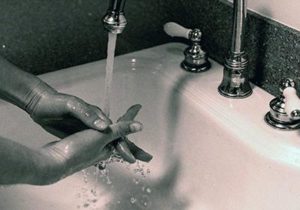 Before the relationship between germs and disease was widely known, one of the main reasons people wanted a water company in their community was not for personal hygiene but to keep houses, businesses and streets clean.
Before the relationship between germs and disease was widely known, one of the main reasons people wanted a water company in their community was not for personal hygiene but to keep houses, businesses and streets clean.
When the germ-disease relationship was confirmed in the late 1800s by such scientists as Louis Pasteur (who built on the work of Hungarian obstetrician and handwashing advocate Ignaz Semmelweis), the need for personal hygiene was more widely recognized and promoted.
Washing hands with soap and water was often encouraged through public health campaigns — not only for the health of the individual but also for the good of the community.
For example, in 1909, the Indiana Board of Health and Board of Education published health guidelines for school-aged children. One rule was to “(k)eep your fingernails clean and wash your hands frequently.” The guidelines also noted that “all children should observe the proceeding rules for their own sake and for the sake of others ….”
Beginning around the time of World War I, the National Association for the Study and Prevention of Tuberculosis, now known as the National Lung Association, started the Modern Health Crusader, an education program focused on children’s health. Its rules included getting fresh air, exercising, getting a good night’s sleep, and washing hands. The program stated that the “prime objective in the crusade is the protection of the community’s health.”
A decade later, an advertisement for Lifebuoy soap enticed people to buy the product by saying, “Surely for your own sake — for the sake of others — you’ll gladly take this simple protective measure. Wash hands oftener.”
A newspaper story from 1938 offered the same advice: “Clean hands are one of the first requirements for a person who is health conscious.” Hands “need to be washed often with soap and water in order to protect your own health and the health of others.”
Then during the midst of World War II, a wartime advertisement declared being healthy was your patriotic duty. Staying home sick meant lost time at work, “delaying production so vital to Victory.” Readers were urged to wash their hands, brush their teeth, and take baths. American workers needed to “take greater precaution against germs … germs which can cause sickness, even epidemics. It’s your patriotic duty to cooperate!”

